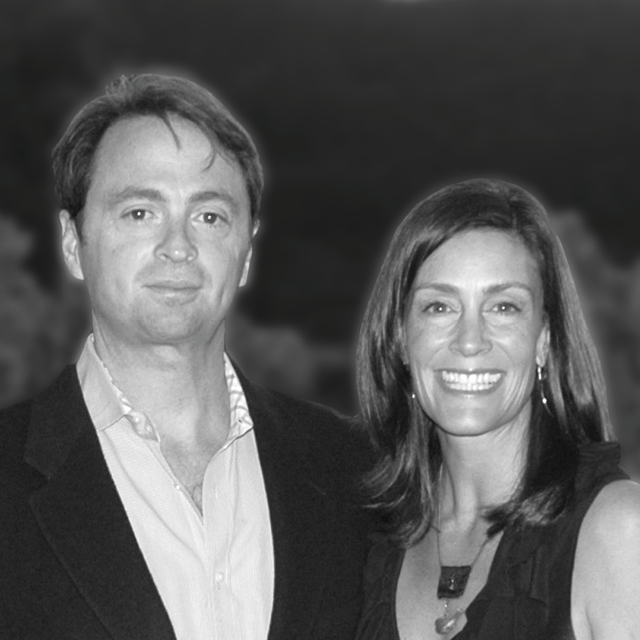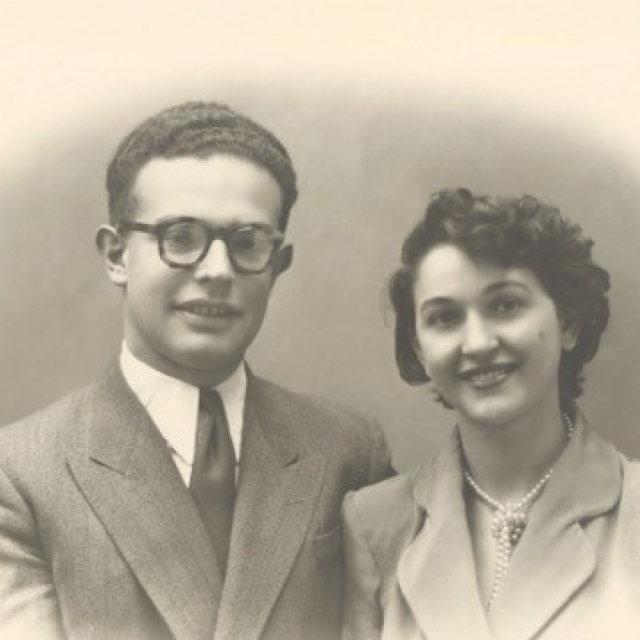Above: A group gathers for dinner to celebrate the Lou and Nancy Grasmick Research Fellowship in Cardiology. Back row, from left to right: Roger Blumenthal, M.D., Steven Schulman, M.D, Josh Grasmick, Ed Kasper, M.D. and Geoffrey Lynn, Ph.D. Everyone else, from left to right: Debbi Kasper, Lisa Hammann, Wendy Post, M.D. , Sarah Grasmick, Bobbi Schulman, Nancy Grasmick, Ed.D., Eunice Yang, M.D., Charlene Tomaselli, Gordon Tomaselli, M.D. and Adrienne Rose.
While the rest of the country celebrated the bicentennial with parades, flags and fireworks, Joyce Koons, her father and three brothers sat on a hallway bench in The Johns Hopkins Hospital on July 4, 1976, nervously listening to cardiac surgeon Vincent Gott, M.D.
Gott, a gifted surgeon who performed the hospital’s first heart transplant with Harvey Bender, M.D., was about to replace the mitral valve in the heart of Joyce Koons’ mother. “We looked at this man and hoped for a miracle, which he delivered,” Joyce Koons recalls.
Her father, delighted with his wife’s care, donated funds to build the hospital’s Koons Cardiac Unit in 1977, only to die unexpectedly a year later. Her mother lived until she was 80. Hopkins’ care of the Koons family extended to Joyce’s brother, Joe, as well.
Joyce created the Koons Family Research Endowment to support cardiac surgery at Johns Hopkins and to express her gratitude for its generation-spanning role in her family’s story. “I love Hopkins and am so thankful for the doctors and nurses,” says Joyce Koons, herself a patient of Johns Hopkins cardiologist Wendy Post, M.D., M.S.
The current Koons Family Research Fellow, Alejandro Suarez-Pierre, M.D., a postdoctoral researcher at the Johns Hopkins Cardiac Surgery Research Laboratory, uses this support to broaden possibilities for his research and patient outcomes. “Donor commitment positively impacts research productivity, especially in today’s environment of decreased federal funds to medical research,” Suarez-Pierre explains.
His research includes examining the current allocation system to distribute hearts to transplant patients. Suarez-Pierre has shown that using hepatitis C donors in tandem with the delivery of new-generation anti-virals to organ recipients could expand the donor pool by 9% — exactly the life-saving transformation Joyce Koons hopes her support will create: “If I can make the difference in someone’s life through education, that’s what I want my gift to do.”
A transformative relationship with the Division of Cardiology also moved Nancy Grasmick, Ed.D., Ph.D., to create the Lou and Nancy Grasmick Research Fellowship in Cardiology. Lou, who died in 2016, was a member of the Heart and Vascular Institute board of governors and had two bypass surgeries at Johns Hopkins. “We became devoted to the department,” says Nancy (Ed. ’80), who serves on the Peabody Institute Advisory Board. “When Lou passed, I immediately thought of the cardiology division because they truly extended his life.”
As the inaugural Lou and Nancy Grasmick Fellow, Eunice Yang, M.D. (Med. ’13), chief fellow, Division of Cardiology, is pursuing research on patients with undiagnosed atrial fibrillation and a condition known as heart failure with preserved ejection fraction (HFpEF). “I have been at Hopkins since medical school, but it is the opportunities like the Lou and Nancy Grasmick cardiology fellowship that inspired me to stay for my clinical training after graduation,” Yang says. Fellowship funding is key to help her demonstrate that atrial fibrillation is a modifiable predictor of poor outcomes in HFpEF patients, and that using electrophysiology interventions can improve their symptoms.
Grasmick is thrilled that her gift is furthering such groundbreaking, heart-saving research: “I think Johns Hopkins is remarkable. Hopkins was absolutely dedicated to Lou. We used to smile at each other and say, ‘Hopkins, that’s the house of miracles.’”


